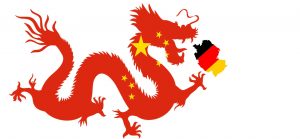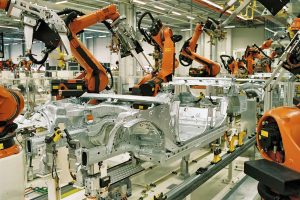Beijing’s shopping sprees among European high tech firms stand in stark contrast to the restrictive access to markets in the Land of the Dragon…

Of course, it was a coincidence that German Chancellor Angela Merkel departed on a state visit to China at the very moment that the debate regarding Chinese investment in Germany reignited. Such state visits are organized well in advance, of course. The flare-up, however, had little to do with the fact that the Frankfurt-Hahn regional airport is slated to be turned over to a Chinese construction firm – the airport is a loss-maker that many will be happy to be rid of. But this is not the case when it comes to the Kuka industrial robotics company. Under CEO Till Reuter, the Augsburg-based company has recently seen an upswing, and has even ascended to the ranks of global market-leader in some areas.
An investor from China has now offered several billion euros for Kuka – an offer which has prompted a public outcry. One daily newspaper reported on the proposed takeover under the headline “The Chinese at the Trough”. German Economics Minister Sigmar Gabriel has also said that he would be very happy if an alternative offer based in Germany or Europe could be found.
To date, however, no other firm has been willing to step up to the plate, Siemens included.
Appealing destination
This political intervention was nonetheless sufficient to scare off the Chinese government and large investors. Through its foreign investment strategy, China hopes to reduce its dependence on exports and gain access to important markets and key technologies. From Beijing’s perspective, this is the next logical step to becoming one of the world’s leading economies. Germany, which boasts an open market, a stable legal framework and a large number of mid-sized high-tech companies, of which many are market leaders in their field, is an appealing destination for the Chinese investment strategists.
And compared to the US, Germany has far fewer security barriers in place that would hinder direct investment.
Until now Germany has generally welcomed Chinese investment, in part because it has helped to safeguard jobs. But this may be about to change. The reason, say business people in Beijing, is the “asymmetry” between the German economy’s openness to Chinese investors and the growing hurdles confronting German companies in China. “We have strong indications that further opening has not only slowed but seems on the brink of turning in the wrong direction,” said the German ambassador in Beijing, Michael Clauss, in the Hong Kong daily, the South China Morning Post. According to Clauss, German companies are being confronted with bureaucratic hurdles, including inspections and requirements for licenses, that are making it increasingly difficult to do business.
Chancellor Merkel’s visit to China, therefore, presented an opportune moment for her to make her opinions known regarding China’s position within the global economy. As Merkel is aware, China continues to display deficits, both in terms of human rights as well as with respect to economic issues. Reforms are still necessary in both the steel sector and in other areas. But, Merkel said, “no person has an interest in larger trade wars. We don’t want that between the EU and China. But that also means we need to speak openly about existing problems.”
China, for example, is currently exporting a great deal of steel due to its own excess capacity, which is leading to serious problems for the European steel industry. “We of course must see to it that we have fair conditions of competition,” Merkel added. When China joined the World Trade Organization in 2001, a 15-year transition period was agreed upon. That period will come to an end during 2016. This explains why China is keen to obtain “market economy” status from the EU, as that would make it more difficult for the EU to impose protective tariffs against Chinese companies. However, granting such status to China is a move opposed by some EU member states, who argue that the Chinese economy remains under substantial state control.

BMW_Leipzig_MEDIA_050719Karosseriebau_max-Wikimedia-(CC-BY-SA-2.0)
But this has not dampened the expansionary enthusiasm of Chinese companies. In 2014, Chinese investment in Germany and Europe soared to record levels. This trend did not abate during 2015, as consultancy firm EY noted. Germany remained the preferred site, with 36 companies being purchased last year. The largest deal, however, was to go to the second-favored destination for Chinese investment, Britain, when Hutchinson agreed to buy Telefonica-subsidiary O2 for $15.4 bn.
The merger, however, was blocked by the EU commission.
Long-term success
According to experts, fears of a “yellow threat” are exaggerated. Thus far, most transactions have been a net positive for the target companies. One reason is that Chinese investors are operating on an entirely different timescale than Anglo-Saxon private equity funds or other large investors. Whereas American and British investors usually push for a hefty return as quickly as possible while always keeping an eye out for the most profitable moment to exit their investment, Chinese investors are more interested in long-term success. Word of these positive experiences with investors from the Far East has now gotten around to German mid-sized companies, says EY partner Yi Sun.
At the same time, Chinese investors are no longer motivated by the desire to establish a market foothold, which they have meanwhile accomplished in most areas. As Sun notes, “Many Chinese companies are now aiming to build up new business areas with higher-margin products.” This is echoed by the largely mediatory note which Chancellor Merkel struck in Beijing. In return, Merkel was awarded an honorary doctorate from the University of Nanjing at a ceremony held at the Chinese Academy of Sciences. The university honored the Chancellor’s commitment to legal dialogue, her attempt to find solutions to regional conflicts, her engagement in the refugee crisis, and her efforts to counter climate change. With her “determination and wisdom”, said the university president, Merkel had “made a contribution to world peace.” Her pursuit of a “pragmatic China policy” is an important contributor to promoting collaboration and mutual trust between the two nations.
Klaus Dieter Oehler is financial editor at the daily Stuttgarter Zeitung
